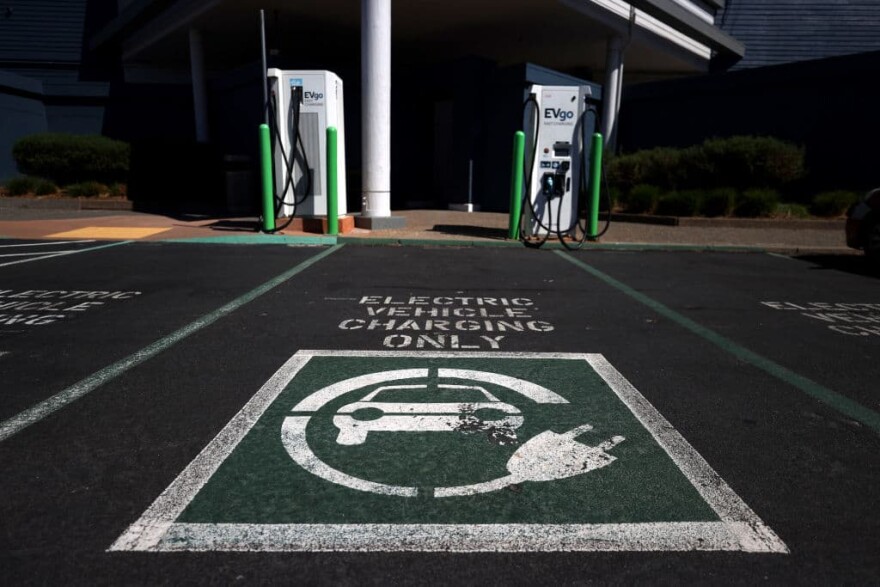President Biden’s $2 trillion infrastructure plan includes a vision to rev up the American market for electric cars.
The push for electric vehicles isn’t just coming from the federal government. Many major automakers have also announced their plans for electric cars. Nora Naughton, auto reporter for The Wall Street Journal, says the move has been “a long time coming.”
Electric cars are complex and can’t be engineered overnight, she says. But largely, U.S. companies have noticed the globalized industry for electric cars growing in places like China and Europe, where companies must follow strict emissions regulations, she says.
Now, companies are envisioning how to make electric vehicles that align with many Americans’ desires for hefty trucks and SUVs.
“That’s why you start to see this push from the automakers here to give us not the Chevy Bolt, not the [Toyota] Prius,” she says, “but something that looks more like the gas-powered cars that Americans already eat up like an electric [Chevrolet] Silverado or a [Ford] F-150.”
The current market is niche: Only 1% of the vehicles on the road today in the U.S. are electric. Naughton says multiple roadblocks are holding automakers back from accelerating their efforts, including the little revenue made on electric cars and the lack of nationwide infrastructure to recharge electric car batteries.
“Car companies have figured out this big engineering riddle of building a battery that can last you just about as many miles as a full tank of gas,” she says. “But then when you have to recharge that battery, it’s not quite as simple as filling up your tank.”
Biden’s American Jobs Plan aims to solve that problem, using grants, loans and tax credits to encourage the switch to electric vehicles and invest in more charging stations. Biden’s plan promises to install at least 500,000 charging stations before the end of the decade, up from about 100,000 now.
But it may be more complicated than that, Naughton says. Most owners of electric vehicles have installed the charging infrastructure into their garages or driveways so their cars can fuel overnight. That’s often not possible during a road trip, she says.
Gas-powered cars take minutes to fuel up at a gas station, but as Naughton personally discovered during a road trip two years ago, electric cars sometimes need hours to charge, she says.
Jonathan Levy, chief commercial officer of Los Angeles-based electric vehicle charging company EVgo, argues a lot has changed over the past few years since Naughton’s road trip. Newer and next-generation models can charge at higher power rates, which he says cuts down on time.
EVgo is part of an industry that is steadily expanding. Levy says his company boasts more than 800 fast-charging locations across 34 states, but the bulk of the installations are in California.
The Biden administration’s leadership on electric vehicles within The American Jobs Plan “is a great thing,” Levy says. The government needs to enact complementary policies and investments early on in order for electric vehicles and charging companies to succeed and to ultimately get more Americans behind the wheel of electric cars, he says.
“It does take time to ramp and we’re at the early days of it. We know that we have to build out that infrastructure in tandem with vehicle adoption,” he says.
Very few people buy an electric vehicle and then go back to gas-powered cars, Levy says, because electric provides a better acceleration plus a smoother and quieter ride. That means it comes down to educating Americans about the benefits of electric cars in order for the market to expand, he says.
Price may be another obstacle, but auto reporter Naughton says car companies are looking for ways to drive down the costs. For example, General Motors is trying to reduce battery cell costs by 2025.
Cars in general are getting more and more expensive, she notes.
While Biden’s infrastructure plan still needs Congress’ stamp of approval, Naughton says the announcement from the government on their commitment to electric cars marks a turning point for the U.S. auto industry. Car companies have been seeking federal support for the shift to electric, she says.
“All the car companies have been asking for in the American market is a direction to run in,” she says, “and now they have one.”
Chris Bentley produced and edited this interview for broadcast with Tinku Ray. Serena McMahon adapted it for the web.
This article was originally published on WBUR.org.
Copyright 2021 NPR. To see more, visit https://www.npr.org. 9(MDIyMjUyODczMDE0NTMzMDcxODE2NTgwYQ000))



